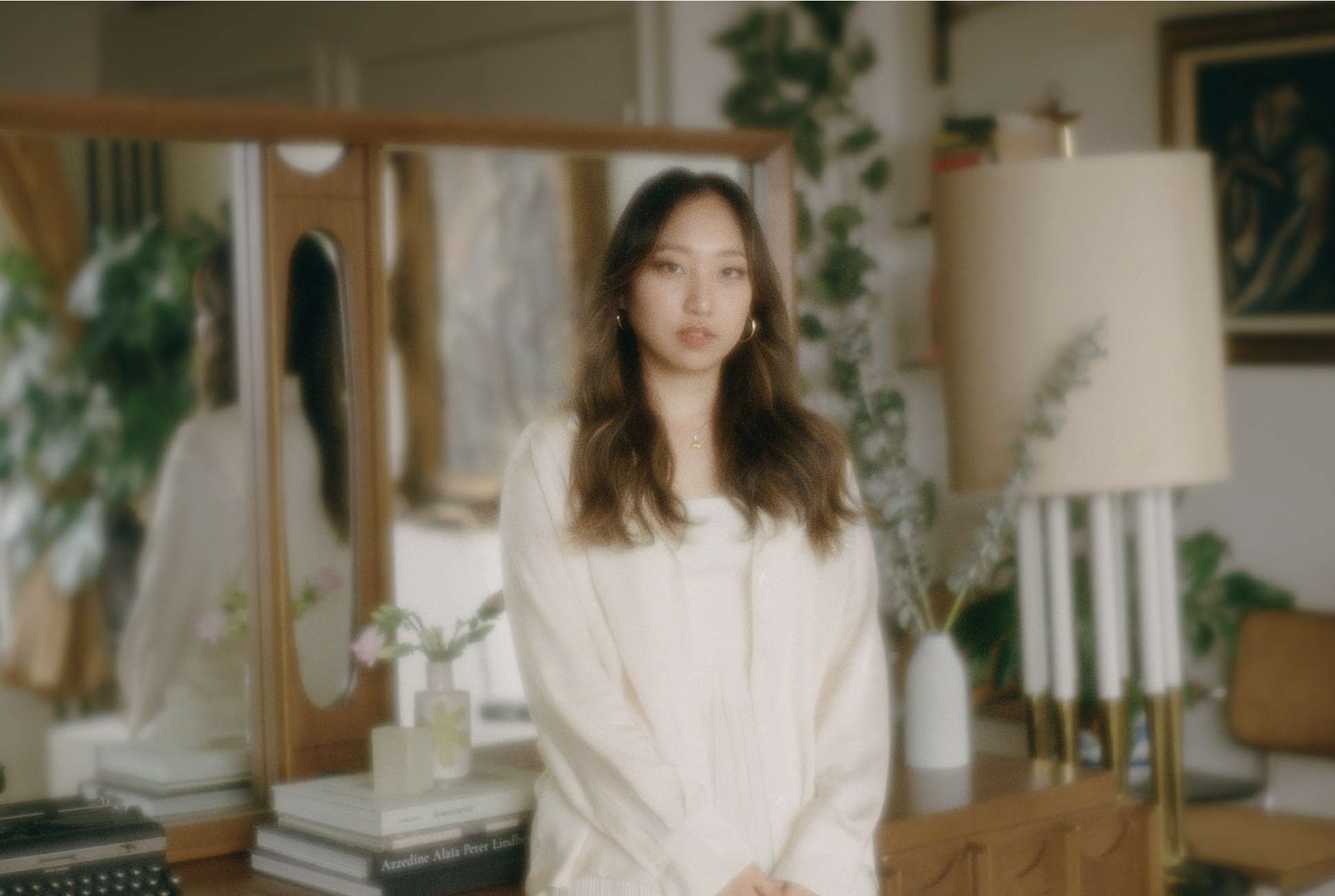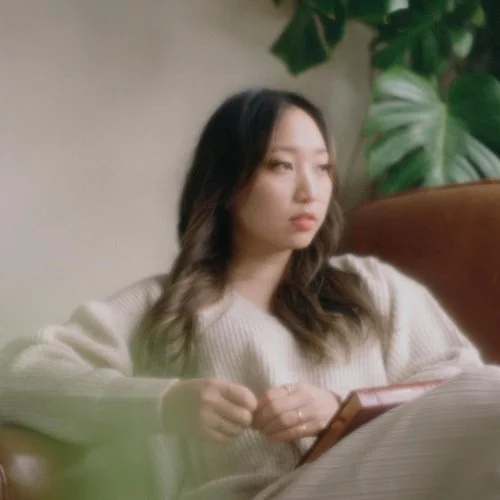How Sarah Kang Remembers Falling in Love
Sarah Kang makes beauty and poetry out of everyday matters. On her debut album, she wrote about love as she remembered it.
This story is part of The Reissues Project, a series that reviews overlooked music made by Asian artists.
There’s a charming moment early on in Sarah Kang’s debut album “how i remember” where her husband Andrew Kang joins her on the track “cheeze ''.
“So,” Andrew asks his wife, “what kind of cheese do you like?”
“I like swiss,” Sarah replies gamely. Briefly, they trade flavors they enjoy until they land on one in agreement:“Cheddar!” They shout as they break into giggles.
This man, Kang confesses in the song, caught her off-guard. She never used to be ther romantic type. “I used to roll my eye/ Just couldn’t sympathize,” she sings in the opening verse, “With cards on Valentine’s Day/ And couples who say ‘babe’.” But meeting her husband, she sings, made her reconsider how queasy romantic schmaltz makes her. “When it comes to you and me,” she sings with a metaphorical wink, “I don’t mind a little cheeze.”
What I appreciate about “Cheeze” represents what I find so charming about Kang’s entire body of work. She humbly, unapologetically only wants to be an ordinary person. By design, there are no big swings here. Kang’s lyrics are wry, intelligent observations about growing older, finding love, and accepting, sometimes with joy, that she’s not the coolest girl in the world.
Kang had already made a name for herself in the Asian R&B music scene when she released “how i remember” in 2022. For the entirety of her career, Kang has been independent, beholden to no one except her own mind and guitar. To date, this is the first review of the album. Despite the reverence she commands, particularly from young Asian musicians, Kang has received no glowing profiles in publications like Rolling Stone, The New Yorker or The New York Times. Though her presence as a singer based in New York City who often plays around town at pubs and jazz bars would certainly make sense in any of these publications, she has received a disappointing lack of mainstream press.
Yet the choice to remain independent has preserved Kang’s authenticity, something that I don’t think is easy to duplicate. What I admire is Kang’s point of view: She’s like the cool older sister who tells you with a keen eye that she’s messed up before, too, and that you’ll be okay. She’s wise, vulnerable when necessary, and always quick to put the blame on herself if needed. In interviews, she’s frankly discussed her challenges with Christianity, being the daughter of a pastor, and her issues with the hierarchical structure of Korean culture. And she posses command over her fanbase: When I reviewed her “Hopeless Romantic” tour, I was heartened by how many young Asian fans saw themselves in her story of a Christian girl who went to Yale, studied hard, found love, married and embraced a life of creativity and adventures doing the laundry with her husband. Kang does not care if that makes her sound lame. She embraces it.
A quick glance through her discography shows that Kang’s music is made for lovers. Her biggest tracks like, “Fall for You” and “Summertime Is For Falling in Love”, unpacks what makes love so spellbinding. But Kang is also an artist who wrestles with what love means. She doesn’t always understand if she’s losing control of herself if she gives in. “I don’t believe in soulmates,” she sings on “If I Fall For You.” “But I won’t let that get in the way.”
Love seems to disturb Kang at times, particularly the depths of her own love and what changes within her when she allows herself to fall for someone. These messy, complicated feelings gracefully find their way onto “how i remember”. On the album’s biggest hit, “once in a moon'', she looks back with a wince at the one who got away. “For the first time/ I would like my name just because you say it,” she sings wistfully. “And I would memorize every line and hair/ Just to remember when you aren’t there.”
Memory is a core concept of this album. In the opening track, “Prologue”, Kang asks her love to “rewind to the prologue/ Before shit hit fan.” Could they put their rose colored glasses back on, and look back with fresh eyes, she wonders? For the next eleven songs, Kang attempts to make sense of where things went wrong, or on a higher level, to make sense of love itself.
On “miss u”, Kang admits that she never knew the relationship would end so fast. “I thought we’d have more time,” she admits, “So I let the weeks go by.” She tries to move on and hopes that she can forget that the relationship ever happened. “But there’s no use,” she counters to herself, “If I’ll always love you.”
Kang understands that there is no GPS in love, as she writes in the track “handbook”. No partner comes with a manual even though she knows that some assembly will always be required. Instead, what Kang begins to realize is that love requires communication and listening. “Give me all your mess,” she asks because love requires getting in the mud for things to work.
In recent years, some of Kang’s most intriguing work has been created through collaboration. One glance through her discography shows a list of Asian artists who are forging their own paths like Lee Jin Ah, HOHYUN, and Patrick Hizon. This holds true for “how i remember”.
Kang assembled a masterful list of collaborators for this record: the Korean rockabilly indie darling Juju B. Goode, the gifted soulful Filipino-Korean singer Orion Song, and the pianist Takahiro Izumuikawa are just some of the names she brings onboard. Each singer compliments Kang’s strengths: On “goodnight”, Juju and Kang wish for someone to guide them through life. Getting older is scary, they realize, and wouldn’t it be nice to have an adult in the room? “Might be foolish/ But sometimes I wish/ Someone could tuck me in and turn out the lights,” she sings in the first verse.
In the Orion Song collaboration “let’s run away”, the pair wonder what would happen “if we just changed all our plans?” Here, Kang excels at capturing the possibilities that love provides us, and the endorphin rush of romance. It helps, too, that Song’s honey voice is so rich with beauty.
But the track that I love most is “about time”, Kang’s collaboration with Izumikawa. As Kang remembers key moments of her youth, from her first date at 18 (“I think it was Toy Story 3?”) to the first moment she knew she’d fallen in love with Andrew in her dorm room on York Avenue in college.
This year, when Kang spoke to reporter Jane Park of her alma mater Yale Daily News, she recalled how normal her courtship with Andrew was. They met at a Yale worship service, and as Sarah remembered, “weren’t even each other’s types.” Their relationship grew from a friendship and an attraction that built over time. “I think I’m more and more convinced that, yeah, I’m glad I didn’t look for the kind of fiery, immediate attraction type of love?” said Kang. “Which is a perfectly legitimate way to fall in love, too. It just wasn’t for me and Andrew.”
Time, Kang writes, moves on and takes the memories with her. “She’ll steal away our youth,” Kang sings, “But that’s how I’ll remember me and you.”
Kang recalls how some nights, as she and Andrew sit on their couch and watch a movie, occasionally they'll look over at one other and talk about how strange it is to grow older together. ‘Ah, this moment is passing,” Kang remembers saying to Andrew once, “And one day, we’re going to look back on it.”
On “how i remember”, Kang saves those memories for the days when she’ll need to be reminded of what it was like to be young and in love.



